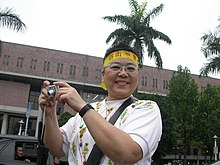Activism
As an activist,Ho has been drawing attention to women's rights in Taiwan since the 1990s. Though there were no laws criminalizing sexual harassment at the time,sexual assaults on women were increasingly reported in the news after the first legal case on sexual harassment was heard in 1989. In May 1994,Ho led Taiwan's first demonstration against sexual harassment,and devised its slogan,"We don't want sexual harassment,we want orgasms. If you keep sexually harassing us,we'll cut it off with a pair of scissors!" [8]
Zoophilia webpage incident
In April 2003,an article appeared in the China Times claiming that Ho's website had several pages that covered the topic of zoophilia and actively promoted the practice,with images. 13 conservative groups collectively filed a complaint accusing Ho of making obscenities available to children. [9] This sensationalism led to thirteen Christian and conservative organizations collectively filing a complaint with the Taipei District Court. The process lasted for over one year,with a not guilty ruling returned on 15 September 2004,because the zoophilia pages were only one part of the website's essays and reports. Thus the incorporation of some pictures did not constitute an obscenity. [10]
The incident has been seen as an example of sensationalist media and received international attention as a perceived confrontation between conservative aspects of Taiwanese society and sexual freedom. [9] [11]

Homosexuality has been documented in China since ancient times. According to one study by Bret Hinsch, for some time after the fall of the Han dynasty, homosexuality was widely accepted in China but this has been disputed. Several early Chinese emperors are speculated to have had homosexual relationships accompanied by heterosexual ones.
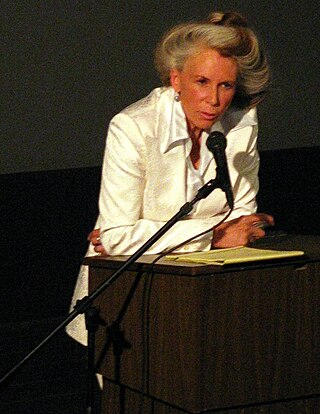
Catharine Alice MacKinnon is an American feminist legal scholar, activist, and author. She is the Elizabeth A. Long Professor of Law at the University of Michigan Law School, where she has been tenured since 1990, and the James Barr Ames Visiting Professor of Law at Harvard Law School. From 2008 to 2012, she was the special gender adviser to the Prosecutor of the International Criminal Court.
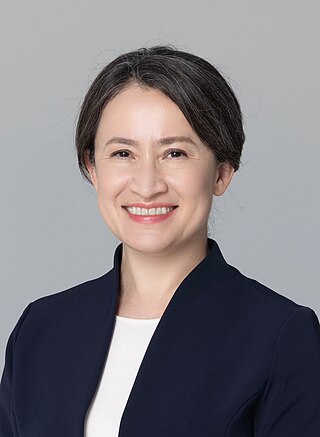
Hsiao Bi-khim is a Taiwanese politician and diplomat who has been the 13th and current vice president of the Republic of China since 2024, serving under President Lai Ching-te. She is Taiwan's first biracial vice president. She was the Taiwanese representative to the United States from 2020 to 2023, and formerly served as a legislator of the Legislative Yuan from 2002 to 2008 and again between 2012 and 2020.

Prostitution in Taiwan was made illegal under a 1991 law. Legislation was introduced in 2011 to allow local governments in Taiwan to set up "special zones" where prostitution is permitted. Outside these zones prostitution is illegal. As of 2017 no "special zones" had been opened.

Taiwan Pride is the annual LGBTQ pride parade in Taiwan. The parade was first held in 2003. Although joined by groups from all over the country, the primary location has always been the capital city of Taipei. The parade held in October 2019 attracted more than 200,000 participants, making it the largest gay pride event in East Asia. As of 2019, it is the largest in Asia ahead of Tel Aviv Pride in Israel, which is the largest in the Middle East. Taiwan LGBT Pride Community, the organizer of Taiwan LGBTQ Pride Parade, holds the parade on the last Saturday of October.
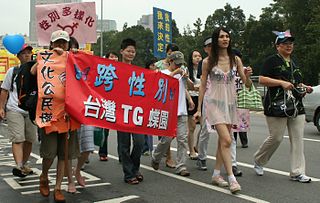
Taiwan TG Butterfly Garden, established in 2000, is the first formal transgender support group in Taiwan. Many members are transsexual; others identify as crossdressers, and others might be described as questioning or transgressive.
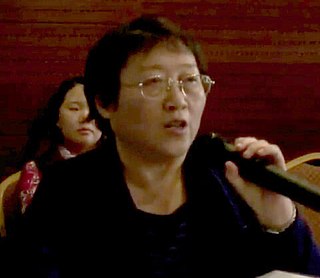
Li Yinhe is a Chinese sociologist, sexologist, and activist for LGBT rights in China. Her main academic interests have been sexual norms in contemporary China, homosexuality, diverse sexual behaviors including sadomasochism, and women's studies.

Sexuality in China has undergone dramatic changes throughout time. These changes can be categorized as "sexual revolution". Chinese sexual attitudes, behaviors, ideology, and relations have especially gone through dramatic shifts in the past four decades due to reform and opening up of the country. Many of these changes have found expression in the public forum through a variety of behaviors and ideas. These include, but are not limited to the following cultural shifts: a separation of sex and marriage, such as pre- and extramarital sex; a separation of sex from love and child-bearing such as internet sex and one-night stands; an increase in observable sexual diversity such as homo- and bisexual behavior and fetishism; an increase in socially acceptable displays and behaviors of female sexual desire; a boom in the sex industry; and a more open discussion of sex topics, including sex studies at colleges, media reports, formal publications, online information, extensive public health education, and public displays of affection.

The rights of lesbian, gay, bisexual, transgender, and queer (LGBTQ) people in the Republic of China (Taiwan) are regarded as some of the most comprehensive of those in Asia. Both male and female same-sex sexual activity are legal, and same-sex marriage was legalized on 24 May 2019, following a Constitutional Court ruling in May 2017. Same-sex couples are able to jointly adopt children since 2023. Discrimination on the basis of sexual orientation, gender identity and gender characteristics in education has been banned nationwide since 2004. With regard to employment, discrimination on the basis of sexual orientation has also been prohibited by law since 2007.
Zoophilia is a paraphilia in which a person experiences a sexual fixation on non-human animals. Bestiality instead refers to cross-species sexual activity between humans and non-human animals. Due to the lack of research on the subject, it is difficult to conclude how prevalent bestiality is. Zoophilia, however, was estimated in one study to be prevalent in 2% of the population in 2021.

The Taipei Film Festival is a film festival promoted by the city of Taipei, Taiwan, through the Department of Cultural Affairs of the Taipei City Government. It was first held in 1998, from September 28 to October 5. Currently chaired by cinematographer Mark Lee Ping Bin, Taipei Film Festival is the only festival in Taiwan that offers a New Talent Competition for aspiring directors from around the world and a Taipei Awards competition for Taiwanese filmmakers.
Feminist views on pornography range from total condemnation of the medium as an inherent form of violence against women to an embracing of some forms as a medium of feminist expression. This debate reflects larger concerns surrounding feminist views on sexuality, and is closely related to those on prostitution, BDSM, and other issues. Pornography has been one of the most divisive issues in feminism, particularly in Anglophone (English-speaking) countries. This division was exemplified in the feminist sex wars of the 1980s, which pitted anti-pornography activists against pro-pornography ones.
The following outline is provided as an overview of and topical guide to human sexuality:
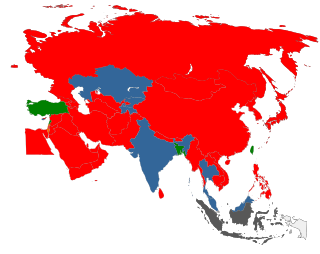
Prostitution in Laos is regarded as a criminal activity and can be subject to severe prosecution. It is much less common than in neighbouring Thailand. Soliciting for prostitution takes place mainly in the city's bars and clubs, although street prostitution also takes place. The visibility of prostitution in Laos belies the practice's illegality. As of 2016, UNAIDS estimates there to be 13,400 prostitutes in the country.
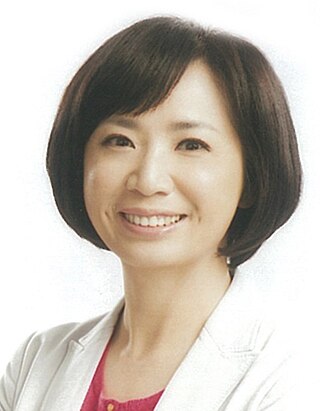
Ho Hsin-chun is a Taiwanese politician. A member of the Democratic Progressive Party, she has served on the Legislative Yuan since 2012.
Despite the history of colonisation and the resulting process of Westernisation since 1842, Hong Kong still embodies many aspects of Chinese traditional values towards sexuality. It is traditionally believed that heterosexuality is the nature, coherent, and privileged sexuality. Popular media marginalises and discriminates against LGBT members of Hong Kong in an attempt to maintain "traditional lifestyles".
Taiwan has a complex history of feminist and women's rights movements with periods of progressiveness where feminism and strong female icons flourished and periods of strict authoritarianism where equality and individual rights were devalued. Thanks in part to the work of generations of feminists, Taiwan is nowadays one of the most gender-equal countries in Asia, consistently ranking higher than its East Asian neighbors in international indices on gender equality.

Wei Tingting is a Chinese LGBTI+ and feminist activist, writer and documentary filmmaker. She is one of the Feminist Five.
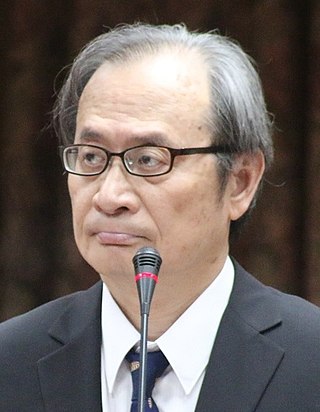
Hsieh Shou-shing is a Taiwanese politician who served as minister of the Atomic Energy Council from 20 May 2016 to his removal from office on 11 January 2023.
Janet Elizabeth Halley is an American legal scholar who is the Eli Goldston Professor of Law at Harvard Law School. Her work is influenced by critical legal studies, legal realism and postmodernism.
